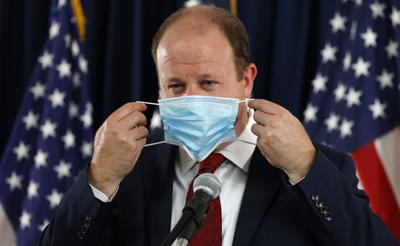Colorado faces a swelling third wave of COVID-19 cases, state officials warned Tuesday, the same day the national pandemic death toll surpassed 200,000.
The state is experiencing a "significant outbreak" of the virus among 18- to 25-year-olds, "the bulk of whom attend Boulder," Gov. Jared Polis said during a news conference, referring to the nearly 860 on-campus diagnoses at the University of Colorado Boulder since school began in late August.
But Colorado is also reporting a "rapid acceleration" of the virus spreading in all age groups, officials said — an increase considered a "warning sign for us, just as we had a warning sign in July and were able to correct course," Polis said.
"We're not quite doing well enough," he said, later adding, "Let's not have a big third wave of this here."
The state's seven-day average of new cases of COVID-19, the disease caused by the coronavirus, has doubled in the past two weeks, reaching more than 500 new cases per day.
The two-week increase in cases follows a relatively stable three-week period that began in mid-August, which followed a six-week surge and decline that started in late June.
The current increase is occurring faster than it did during the summer surge, more resembling the initial growth of known cases early in the pandemic this spring, officials said.
The growth in cases could be attributed to the community spread stemming from campus-based infections, but causality hasn't yet been established, Polis said. Presumed decreased social-distancing over the Labor Day weekend may also have contributed to the increase in cases, officials added.
Boulder County accounted for more than one of every five new cases over the past two weeks, even though the county comprises only about 5 1/2% of the state’s population.
Logan County, where outbreaks have been reported among prisoners and staff at the Sterling Correctional Facility, has also experienced a significant increase in cases, officials said. Over the past month the prison has reported no new cases among inmates, but has experienced a steady rise in staff cases — increasing from 41 confirmed cases in late August to 51 in most recent outbreak report last week.
Colorado ranks seventh in the nation for highest "R-naught" value — the ratio of those subsequently infected for every one person who catches the virus — according to the website rt.live, Polis said. The website uses data from The COVID Tracking Project, which was launched by journalists from The Atlantic and staffed by volunteers.
"Some national projections of the R-naught value are very alarming," Polis said, adding the "biggest factor in that" is infections among the college-age population.
Diagnoses in the state have trended upward 12 of the past 14 days, and hospitalizations have increased eight of the past 14 days. However, hospitalizations are expected to be lower among younger populations. Additionally, growth in hospitalizations often lags an upward trend in case count, officials cautioned.
Last week the state saw a 45% increase in cases week over week, mirroring the percent of increase during the summer wave, although estimated rates of social-distancing statewide are "a little higher" than they were in July, said Rachel Herlihy, an epidemiologist with the state health department.
Coloradans' weariness could be contributing to the virus' new spread, Polis said.
"Any decrease in social-distancing or mask-wearing would be to the benefit of the virus," he said. "I think we're past the half-way point but not yet in the final sprint. But we're getting there. To use a football analogy, we're in the third quarter."
When asked his thoughts on the Trump administration's handling of the pandemic, Polis said Tuesday was "a day of mourning, a day of reflection," with the country passing the 200,000-death milestone.
"My role as governor isn't to engage in political punditry," he said. "I think that what's clear is that America could have done better. That's not just a hypothetical statement. Many nations have done better. How have they done better? Less deaths per capita."
Polis called it "tragic" that the U.S. has one of the higher per-capita death rates in the world.
"I think there will be plenty of time for a post mortem to better prepare America for what lies ahead," he said, adding he would like to see a "solid, science-driven process" to better prepare the country for future pandemics.
From the beginning of the pandemic the country faced "a lack of a coordinated national strategy," Polis said. States such as Colorado have risen to the challenge, developing their own protective equipment supply chains and only "occasionally receiving support from the federal government."
"But I hope we take this as a moment of reflection to really make sure we redouble our efforts in the weeks and months ahead to make sure we don't have to mourn another 200,000, another 100,000 [deaths] after this great period of loss," he said.








(0) comments
Welcome to the discussion.
Log In
Keep it Clean. Please avoid obscene, vulgar, lewd, racist or sexually-oriented language.
PLEASE TURN OFF YOUR CAPS LOCK.
Don't Threaten. Threats of harming another person will not be tolerated.
Be Truthful. Don't knowingly lie about anyone or anything.
Be Nice. No racism, sexism or any sort of -ism that is degrading to another person.
Be Proactive. Use the 'Report' link on each comment to let us know of abusive posts.
Share with Us. We'd love to hear eyewitness accounts, the history behind an article.